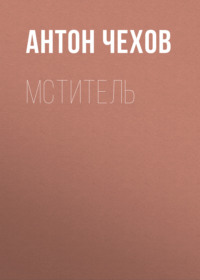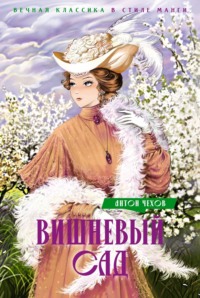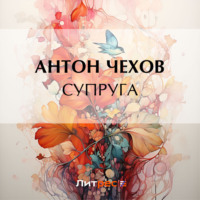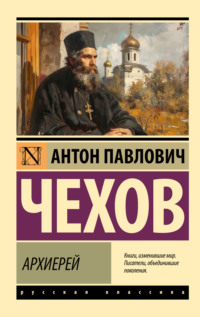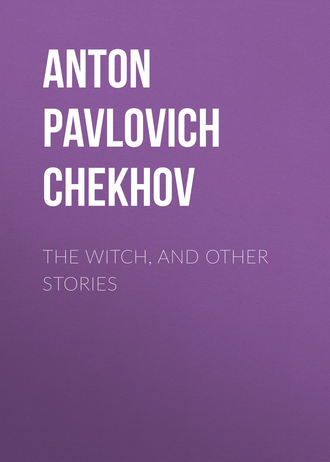 полная версия
полная версияThe Witch, and Other Stories
“I have just been with the priest’s son.”
“Nonsense!”
“I have!”
“It’s a sin!” whispered Sofya.
“Well, let it be… What do I care? If it’s a sin, then it is a sin, but better be struck dead by thunder than live like this. I’m young and strong, and I’ve a filthy crooked hunchback for a husband, worse than Dyudya himself, curse him! When I was a girl, I hadn’t bread to eat, or a shoe to my foot, and to get away from that wretchedness I was tempted by Alyoshka’s money, and got caught like a fish in a net, and I’d rather have a viper for my bedfellow than that scurvy Alyoshka. And what’s your life? It makes me sick to look at it. Your Fyodor sent you packing from the factory and he’s taken up with another woman. They have robbed you of your boy and made a slave of him. You work like a horse, and never hear a kind word. I’d rather pine all my days an old maid, I’d rather get half a rouble from the priest’s son, I’d rather beg my bread, or throw myself into the well…
“It’s a sin!” whispered Sofya again.
“Well, let it be.”
Somewhere behind the church the same three voices, two tenors and a bass, began singing again a mournful song. And again the words could not be distinguished.
“They are not early to bed,” Varvara said, laughing.
And she began telling in a whisper of her midnight walks with the priest’s son, and of the stories he had told her, and of his comrades, and of the fun she had with the travellers who stayed in the house. The mournful song stirred a longing for life and freedom. Sofya began to laugh; she thought it sinful and terrible and sweet to hear about, and she felt envious and sorry that she, too, had not been a sinner when she was young and pretty.
In the churchyard they heard twelve strokes beaten on the watchman’s board.
“It’s time we were asleep,” said Sofya, getting up, “or, maybe, we shall catch it from Dyudya.”
They both went softly into the yard.
“I went away without hearing what he was telling about Mashenka,” said Varvara, making herself a bed under the window.
“She died in prison, he said. She poisoned her husband.”
Varvara lay down beside Sofya a while, and said softly:
“I’d make away with my Alyoshka and never regret it.”
“You talk nonsense; God forgive you.”
When Sofya was just dropping asleep, Varvara, coming close, whispered in her ear:
“Let us get rid of Dyudya and Alyoshka!”
Sofya started and said nothing. Then she opened her eyes and gazed a long while steadily at the sky.
“People would find out,” she said.
“No, they wouldn’t. Dyudya’s an old man, it’s time he did die; and they’d say Alyoshka died of drink.”
“I’m afraid… God would chastise us.”
“Well, let Him…”
Both lay awake thinking in silence.
“It’s cold,” said Sofya, beginning to shiver all over. “It will soon be morning… Are you asleep?”
“No… Don’t you mind what I say, dear,” whispered Varvara; “I get so mad with the damned brutes, I don’t know what I do say. Go to sleep, or it will be daylight directly… Go to sleep.”
Both were quiet and soon they fell asleep.
Earlier than all woke the old woman. She waked up Sofya and they went together into the cowshed to milk the cows. The hunchback Alyoshka came in hopelessly drunk without his concertina; his breast and knees had been in the dust and straw – he must have fallen down in the road. Staggering, he went into the cowshed, and without undressing he rolled into a sledge and began to snore at once. When first the crosses on the church and then the windows were flashing in the light of the rising sun, and shadows stretched across the yard over the dewy grass from the trees and the top of the well, Matvey Savitch jumped up and began hurrying about:
“Kuzka! get up!” he shouted. “It’s time to put in the horses! Look sharp!”
The bustle of morning was beginning. A young Jewess in a brown gown with flounces led a horse into the yard to drink. The pulley of the well creaked plaintively, the bucket knocked as it went down…
Kuzka, sleepy, tired, covered with dew, sat up in the cart, lazily putting on his little overcoat, and listening to the drip of the water from the bucket into the well as he shivered with the cold.
“Auntie!” shouted Matvey Savitch to Sofya, “tell my lad to hurry up and to harness the horses!”
And Dyudya at the same instant shouted from the window:
“Sofya, take a farthing from the Jewess for the horse’s drink! They’re always in here, the mangy creatures!”
In the street sheep were running up and down, baaing; the peasant women were shouting at the shepherd, while he played his pipes, cracked his whip, or answered them in a thick sleepy bass. Three sheep strayed into the yard, and not finding the gate again, pushed at the fence.
Varvara was waked by the noise, and bundling her bedding up in her arms, she went into the house.
“You might at least drive the sheep out!” the old woman bawled after her, “my lady!”
“I dare say! As if I were going to slave for you Herods!” muttered Varvara, going into the house.
Dyudya came out of the house with his accounts in his hands, sat down on the step, and began reckoning how much the traveller owed him for the night’s lodging, oats, and watering his horses.
“You charge pretty heavily for the oats, my good man,” said Matvey Savitch.
“If it’s too much, don’t take them. There’s no compulsion, merchant.”
When the travellers were ready to start, they were detained for a minute. Kuzka had lost his cap.
“Little swine, where did you put it?” Matvey Savitch roared angrily. “Where is it?”
Kuzka’s face was working with terror; he ran up and down near the cart, and not finding it there, ran to the gate and then to the shed. The old woman and Sofya helped him look.
“I’ll pull your ears off!” yelled Matvey Savitch. “Dirty brat!”
The cap was found at the bottom of the cart.
Kuzka brushed the hay off it with his sleeve, put it on, and timidly he crawled into the cart, still with an expression of terror on his face as though he were afraid of a blow from behind.
Matvey Savitch crossed himself. The driver gave a tug at the reins and the cart rolled out of the yard.
THE POST
IT was three o’clock in the night. The postman, ready to set off, in his cap and his coat, with a rusty sword in his hand, was standing near the door, waiting for the driver to finish putting the mail bags into the cart which had just been brought round with three horses. The sleepy postmaster sat at his table, which was like a counter; he was filling up a form and saying:
“My nephew, the student, wants to go to the station at once. So look here, Ignatyev, let him get into the mail cart and take him with you to the station: though it is against the regulations to take people with the mail, what’s one to do? It’s better for him to drive with you free than for me to hire horses for him.”
“Ready!” they heard a shout from the yard.
“Well, go then, and God be with you,” said the postmaster. “Which driver is going?”
“Semyon Glazov.”
“Come, sign the receipt.”
The postman signed the receipt and went out. At the entrance of the post-office there was the dark outline of a cart and three horses. The horses were standing still except that one of the tracehorses kept uneasily shifting from one leg to the other and tossing its head, making the bell clang from time to time. The cart with the mail bags looked like a patch of darkness. Two silhouettes were moving lazily beside it: the student with a portmanteau in his hand and a driver. The latter was smoking a short pipe; the light of the pipe moved about in the darkness, dying away and flaring up again; for an instant it lighted up a bit of a sleeve, then a shaggy moustache and big copper-red nose, then stern-looking, overhanging eyebrows. The postman pressed down the mail bags with his hands, laid his sword on them and jumped into the cart. The student clambered irresolutely in after him, and accidentally touching him with his elbow, said timidly and politely: “I beg your pardon.”
The pipe went out. The postmaster came out of the post-office just as he was, in his waistcoat and slippers; shrinking from the night dampness and clearing his throat, he walked beside the cart and said:
“Well, God speed! Give my love to your mother, Mihailo. Give my love to them all. And you, Ignatyev, mind you don’t forget to give the parcel to Bystretsov… Off!”
The driver took the reins in one hand, blew his nose, and, arranging the seat under himself, clicked to the horses.
“Give them my love,” the postmaster repeated.
The big bell clanged something to the little bells, the little bells gave it a friendly answer. The cart squeaked, moved. The big bell lamented, the little bells laughed. Standing up in his seat the driver lashed the restless tracehorse twice, and the cart rumbled with a hollow sound along the dusty road. The little town was asleep. Houses and trees stood black on each side of the broad street, and not a light was to be seen. Narrow clouds stretched here and there over the star-spangled sky, and where the dawn would soon be coming there was a narrow crescent moon; but neither the stars, of which there were many, nor the half-moon, which looked white, lighted up the night air. It was cold and damp, and there was a smell of autumn.
The student, who thought that politeness required him to talk affably to a man who had not refused to let him accompany him, began:
“In summer it would be light at this time, but now there is not even a sign of the dawn. Summer is over!”
The student looked at the sky and went on:
“Even from the sky one can see that it is autumn. Look to the right. Do you see three stars side by side in a straight line? That is the constellation of Orion, which, in our hemisphere, only becomes visible in September.”
The postman, thrusting his hands into his sleeves and retreating up to his ears into his coat collar, did not stir and did not glance at the sky. Apparently the constellation of Orion did not interest him. He was accustomed to see the stars, and probably he had long grown weary of them. The student paused for a while and then said:
“It’s cold! It’s time for the dawn to begin. Do you know what time the sun rises?”
“What?”
“What time does the sun rise now?”
“Between five and six,” said the driver.
The mail cart drove out of the town. Now nothing could be seen on either side of the road but the fences of kitchen gardens and here and there a solitary willow-tree; everything in front of them was shrouded in darkness. Here in the open country the half-moon looked bigger and the stars shone more brightly. Then came a scent of dampness; the postman shrank further into his collar, the student felt an unpleasant chill first creeping about his feet, then over the mail bags, over his hands and his face. The horses moved more slowly; the bell was mute as though it were frozen. There was the sound of the splash of water, and stars reflected in the water danced under the horses’ feet and round the wheels.
But ten minutes later it became so dark that neither the stars nor the moon could be seen. The mail cart had entered the forest. Prickly pine branches were continually hitting the student on his cap and a spider’s web settled on his face. Wheels and hoofs knocked against huge roots, and the mail cart swayed from side to side as though it were drunk.
“Keep to the road,” said the postman angrily. “Why do you run up the edge? My face is scratched all over by the twigs! Keep more to the right!”
But at that point there was nearly an accident. The cart suddenly bounded as though in the throes of a convulsion, began trembling, and, with a creak, lurched heavily first to the right and then to the left, and at a fearful pace dashed along the forest track. The horses had taken fright at something and bolted.
“Wo! wo!” the driver cried in alarm. “Wo… you devils!”
The student, violently shaken, bent forward and tried to find something to catch hold of so as to keep his balance and save himself from being thrown out, but the leather mail bags were slippery, and the driver, whose belt the student tried to catch at, was himself tossed up and down and seemed every moment on the point of flying out. Through the rattle of the wheels and the creaking of the cart they heard the sword fall with a clank on the ground, then a little later something fell with two heavy thuds behind the mail cart.
“Wo!” the driver cried in a piercing voice, bending backwards. “Stop!”
The student fell on his face and bruised his forehead against the driver’s seat, but was at once tossed back again and knocked his spine violently against the back of the cart.
“I am falling!” was the thought that flashed through his mind, but at that instant the horses dashed out of the forest into the open, turned sharply to the right, and rumbling over a bridge of logs, suddenly stopped dead, and the suddenness of this halt flung the student forward again.
The driver and the student were both breathless. The postman was not in the cart. He had been thrown out, together with his sword, the student’s portmanteau, and one of the mail bags.
“Stop, you rascal! Sto-op!” they heard him shout from the forest. “You damned blackguard!” he shouted, running up to the cart, and there was a note of pain and fury in his tearful voice. “You anathema, plague take you!” he roared, dashing up to the driver and shaking his fist at him.
“What a to-do! Lord have mercy on us!” muttered the driver in a conscience-stricken voice, setting right something in the harness at the horses’ heads. “It’s all that devil of a tracehorse. Cursed filly; it is only a week since she has run in harness. She goes all right, but as soon as we go down hill there is trouble! She wants a touch or two on the nose, then she wouldn’t play about like this… Stea-eady! Damn!”
While the driver was setting the horses to rights and looking for the portmanteau, the mail bag, and the sword on the road, the postman in a plaintive voice shrill with anger ejaculated oaths. After replacing the luggage the driver for no reason whatever led the horses for a hundred paces, grumbled at the restless tracehorse, and jumped up on the box.
When his fright was over the student felt amused and good-humoured. It was the first time in his life that he had driven by night in a mail cart, and the shaking he had just been through, the postman’s having been thrown out, and the pain in his own back struck him as interesting adventures. He lighted a cigarette and said with a laugh:
“Why you know, you might break your neck like that! I very nearly flew out, and I didn’t even notice you had been thrown out. I can fancy what it is like driving in autumn!”
The postman did not speak.
“Have you been going with the post for long?” the student asked.
“Eleven years.”
“Oho; every day?”
“Yes, every day. I take this post and drive back again at once. Why?”
Making the journey every day, he must have had a good many interesting adventures in eleven years. On bright summer and gloomy autumn nights, or in winter when a ferocious snowstorm whirled howling round the mail cart, it must have been hard to avoid feeling frightened and uncanny. No doubt more than once the horses had bolted, the mail cart had stuck in the mud, they had been attacked by highwaymen, or had lost their way in the blizzard…
“I can fancy what adventures you must have had in eleven years!” said the student. “I expect it must be terrible driving?”
He said this and expected that the postman would tell him something, but the latter preserved a sullen silence and retreated into his collar. Meanwhile it began to get light. The sky changed colour imperceptibly; it still seemed dark, but by now the horses and the driver and the road could be seen. The crescent moon looked bigger and bigger, and the cloud that stretched below it, shaped like a cannon in a gun-carriage, showed a faint yellow on its lower edge. Soon the postman’s face was visible. It was wet with dew, grey and rigid as the face of a corpse. An expression of dull, sullen anger was set upon it, as though the postman were still in pain and still angry with the driver.
“Thank God it is daylight!” said the student, looking at his chilled and angry face. “I am quite frozen. The nights are cold in September, but as soon as the sun rises it isn’t cold. Shall we soon reach the station?”
The postman frowned and made a wry face.
“How fond you are of talking, upon my word!” he said. “Can’t you keep quiet when you are travelling?”
The student was confused, and did not approach him again all the journey. The morning came on rapidly. The moon turned pale and melted away into the dull grey sky, the cloud turned yellow all over, the stars grew dim, but the east was still cold-looking and the same colour as the rest of the sky, so that one could hardly believe the sun was hidden in it.
The chill of the morning and the surliness of the postman gradually infected the student. He looked apathetically at the country around him, waited for the warmth of the sun, and thought of nothing but how dreadful and horrible it must be for the poor trees and the grass to endure the cold nights. The sun rose dim, drowsy, and cold. The tree-tops were not gilded by the rays of the rising sun, as usually described, the sunbeams did not creep over the earth and there was no sign of joy in the flight of the sleepy birds. The cold remained just the same now that the sun was up as it had been in the night.
The student looked drowsily and ill-humouredly at the curtained windows of a mansion by which the mail cart drove. Behind those windows, he thought, people were most likely enjoying their soundest morning sleep not hearing the bells, nor feeling the cold, nor seeing the postman’s angry face; and if the bell did wake some young lady, she would turn over on the other side, smile in the fulness of her warmth and comfort, and, drawing up her feet and putting her hand under her cheek, would go off to sleep more soundly than ever.
The student looked at the pond which gleamed near the house and thought of the carp and the pike which find it possible to live in cold water…
“It’s against the regulations to take anyone with the post…” the postman said unexpectedly. “It’s not allowed! And since it is not allowed, people have no business… to get in… Yes. It makes no difference to me, it’s true, only I don’t like it, and I don’t wish it.”
“Why didn’t you say so before, if you don’t like it?”
The postman made no answer but still had an unfriendly, angry expression. When, a little later, the horses stopped at the entrance of the station the student thanked him and got out of the cart. The mail train had not yet come in. A long goods train stood in a siding; in the tender the engine driver and his assistant, with faces wet with dew, were drinking tea from a dirty tin teapot. The carriages, the platforms, the seats were all wet and cold. Until the train came in the student stood at the buffet drinking tea while the postman, with his hands thrust up his sleeves and the same look of anger still on his face, paced up and down the platform in solitude, staring at the ground under his feet.
With whom was he angry? Was it with people, with poverty, with the autumn nights?
THE NEW VILLA
ITwo miles from the village of Obrutchanovo a huge bridge was being built. From the village, which stood up high on the steep river-bank, its trellis-like skeleton could be seen, and in foggy weather and on still winter days, when its delicate iron girders and all the scaffolding around was covered with hoar frost, it presented a picturesque and even fantastic spectacle. Kutcherov, the engineer who was building the bridge, a stout, broad-shouldered, bearded man in a soft crumpled cap drove through the village in his racing droshky or his open carriage. Now and then on holidays navvies working on the bridge would come to the village; they begged for alms, laughed at the women, and sometimes carried off something. But that was rare; as a rule the days passed quietly and peacefully as though no bridge-building were going on, and only in the evening, when camp fires gleamed near the bridge, the wind faintly wafted the songs of the navvies. And by day there was sometimes the mournful clang of metal, don-don-don.
It happened that the engineer’s wife came to see him. She was pleased with the river-banks and the gorgeous view over the green valley with trees, churches, flocks, and she began begging her husband to buy a small piece of ground and to build them a cottage on it. Her husband agreed. They bought sixty acres of land, and on the high bank in a field, where in earlier days the cows of Obrutchanovo used to wander, they built a pretty house of two storeys with a terrace and a verandah, with a tower and a flagstaff on which a flag fluttered on Sundays – they built it in about three months, and then all the winter they were planting big trees, and when spring came and everything began to be green there were already avenues to the new house, a gardener and two labourers in white aprons were digging near it, there was a little fountain, and a globe of looking-glass flashed so brilliantly that it was painful to look at. The house had already been named the New Villa.
On a bright, warm morning at the end of May two horses were brought to Obrutchanovo to the village blacksmith, Rodion Petrov. They came from the New Villa. The horses were sleek, graceful beasts, as white as snow, and strikingly alike.
“Perfect swans!” said Rodion, gazing at them with reverent admiration.
His wife Stepanida, his children and grandchildren came out into the street to look at them. By degrees a crowd collected. The Lytchkovs, father and son, both men with swollen faces and entirely beardless, came up bareheaded. Kozov, a tall, thin old man with a long, narrow beard, came up leaning on a stick with a crook handle: he kept winking with his crafty eyes and smiling ironically as though he knew something.
“It’s only that they are white; what is there in them?” he said. “Put mine on oats, and they will be just as sleek. They ought to be in a plough and with a whip, too…”
The coachman simply looked at him with disdain, but did not utter a word. And afterwards, while they were blowing up the fire at the forge, the coachman talked while he smoked cigarettes. The peasants learned from him various details: his employers were wealthy people; his mistress, Elena Ivanovna, had till her marriage lived in Moscow in a poor way as a governess; she was kind-hearted, compassionate, and fond of helping the poor. On the new estate, he told them, they were not going to plough or to sow, but simply to live for their pleasure, live only to breathe the fresh air. When he had finished and led the horses back a crowd of boys followed him, the dogs barked, and Kozov, looking after him, winked sarcastically.
“Landowners, too-oo!” he said. “They have built a house and set up horses, but I bet they are nobodies – landowners, too-oo.”
Kozov for some reason took a dislike from the first to the new house, to the white horses, and to the handsome, well-fed coachman. Kozov was a solitary man, a widower; he had a dreary life (he was prevented from working by a disease which he sometimes called a rupture and sometimes worms) he was maintained by his son, who worked at a confectioner’s in Harkov and sent him money; and from early morning till evening he sauntered at leisure about the river or about the village; if he saw, for instance, a peasant carting a log, or fishing, he would say: “That log’s dry wood – it is rotten,” or, “They won’t bite in weather like this.” In times of drought he would declare that there would not be a drop of rain till the frost came; and when the rains came he would say that everything would rot in the fields, that everything was ruined. And as he said these things he would wink as though he knew something.
At the New Villa they burned Bengal lights and sent up fireworks in the evenings, and a sailing-boat with red lanterns floated by Obrutchanovo. One morning the engineer’s wife, Elena Ivanovna, and her little daughter drove to the village in a carriage with yellow wheels and a pair of dark bay ponies; both mother and daughter were wearing broad-brimmed straw hats, bent down over their ears.
This was exactly at the time when they were carting manure, and the blacksmith Rodion, a tall, gaunt old man, bareheaded and barefooted, was standing near his dirty and repulsive-looking cart and, flustered, looked at the ponies, and it was evident by his face that he had never seen such little horses before.



